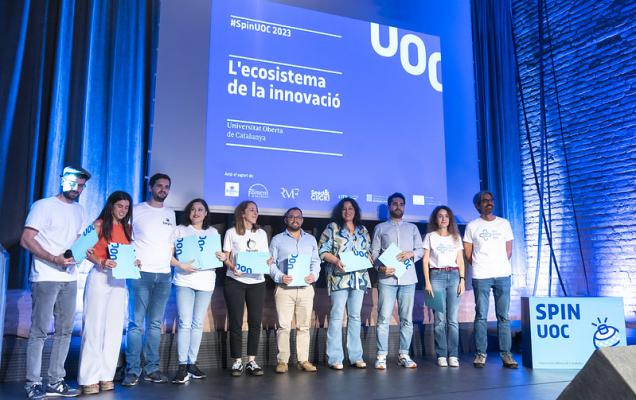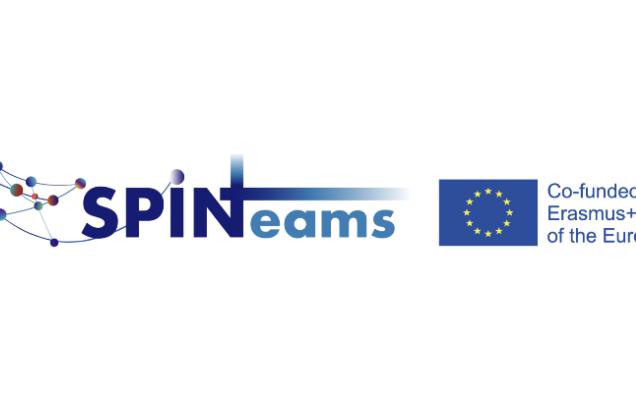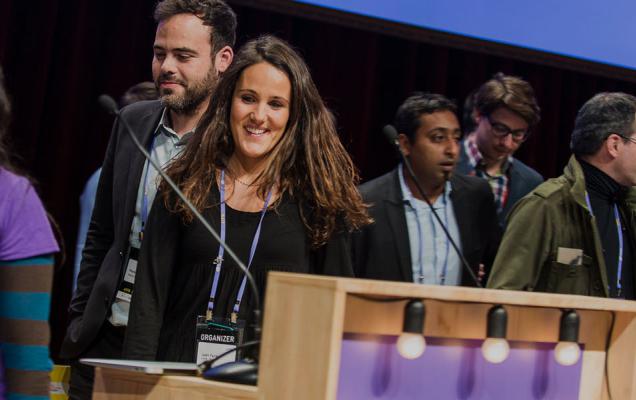Guidance in the entrepreneurial process
Programmes
Guidance in the entrepreneurial process

This programme corresponds to the first Hubbik entrepreneur advisory phase, "Phase 1. Guidance in the entrepreneurial process", the main aim of which is the identification, definition and validation of the business proposal of the projects related to the UOC community, especially those with an ICT connection and in an initial phase.
This mentoring is carried out via the online incubator, the Hubbik open online work and advisory space.
Work is carried out on the definition and validation of the business proposal of the entrepreneurial projects on the basis of three documents:
-
The definition of the business model with a Business Model Canvas (BMC).
-
The drafting of an executive summary, which includes the most relevant business aspects of the project.
-
The preparation of a 90-second video pitch setting out the key aspects of the start-up activity, the stage it is in and the needs it has.
The maximum time limit for this programme is one year after joining.
Any member of the UOC community who wants to work extensively on the definition of an entrepreneurial business idea can gain admission to the programme.
Admission is open all year round.
To apply for admission, you should complete the registration form and accept the general terms and conditions for taking part in the online incubator.
A week after applying for admission, the entrepreneur will receive an email with the details they need to gain admission to the Hubbik online incubator.
In the online incubator, the entrepreneur has access to various services to help them develop their business proposal. Their participation and involvement in them, and the stage of maturity of their project, is what defines their pathway in the online incubator.
The services are in the following work spaces:
-
Networking Social Space with the rest of the UOC entrepreneurial community. This is a work space based on interaction between users, where a range of activities are on offer:
-
Entrepreneur debate: An open weekly forum for discussion on aspects of the entrepreneurial process and related news.
-
Webinars and live events: Every month an expert introduces an aspect connected to the entrepreneurial process, as well as useful tools and methodologies.
-
Share with the community: Forum open to entrepreneurs to share their initiatives and/or resources and tools.
-
Alerts and news: Messages from the Hubbik team with the most relevant information about the different activities going on in the online incubator.
-
-
Skills Section. Repository of training materials on key aspects of the entrepreneurial process. These comprise documents, videos and self-assessment questionnaires. Participants who pass all the questionnaires with an 8 will receive a certificate to show they have passed this capsule.
-
Business idea generation and maturing Key factors for defining entrepreneurial ideas and using tools to develop business models.
-
Funding entrepreneurial projects Investment alternatives in securing financing using internal and external instruments and crowdfunding and crowdsourcing platforms, along with methodologies to find out the valuation of a start-up.
-
Legal issues for entrepreneurs Legislation in the process of creating a business idea: legal form, aspects of intellectual and industrial property protection, the legislation to be complied with when marketing on the internet and personal data protection requirements.
-
Communication for entrepreneurs Basic aspects of project communication and marketing to design a suitable communication strategy and carry out an action plan.
-
Other resources of interest: Templates of the documents to be worked on in Phase 1 of the incubator: Business Model Canvas, executive summary and pitch.
-
-
Ecosystem and entrepreneurial calls. Section listing calls for competitions, subsidies, entrepreneurship programmes, the entrepreneurial ecosystem and anything that may be of interest to UOC entrepreneurial community projects.
In addition, entrepreneurs receive a monthly entrepreneurship newsletter with information about calls and major news.
-
Directory of UOC start-ups, the showcase for raising the profile of the entrepreneurial projects that are currently in the online incubator, so aiding interaction and networking between them. To view both projects that are already under way and others that are still in the development stage.
-
Mentoring Section. Meeting place with mentors, for tailor-made advice and for document sharing.
Projects have access to an initial mentoring to provide an initial analysis of the project and the definition of a route map in the online incubator in the welcome stage.
This route map proposes activities to be carried out during the programme and defines a mentoring calendar to review the evolution of the project documents (Business Model Canvas, pitch and executive summary) together with the mentor.
The programme automatically ends a year after the entrepreneur joins.
If the entrepreneur wishes to continue to access the Hubbik advisory services for projects in a maturation phase, their project must be assessed on the basis of the three documents worked on (Business Model Canvas, executive summary and pitch), with the following criteria:
-
Strategic alignment and social impact: the business idea is assessed in relation to the information and knowledge society and e-learning. If this is not the case, the synergies that the future company may have with the UOC's research groups will also be considered. The social impact, understood as the degree to which the idea may contribute to social transformation and progress, will also be taken into consideration.
-
Innovativeness: the newness of the initiative and the origin of the knowledge from which the project has emerged will be assessed.
-
Viability and market transferability: market knowledge and identification of the material, economic, human, technical and legal resources needed to carry out the project are assessed.
-
Entrepreneurial profile: The interest and commitment shown by the project's sponsors, the academic and professional background of the people behind the initiative, and their communication skills in presenting the project will be considered.
Each of the criteria will be rated with a score between 1 (minimum) and 4 (maximum). Therefore, 4 will be the minimum score a project can have, and 16 will be the maximum.
Every project can only be rated once during its participation on the programme.
If the programme is rated before the period set out in the programme (1 year) and it is not considered to progress to the services offered to projects in the maturation phase, the entrepreneur may continue working on their project and accessing the Hubbik services until their participation period comes to an end.





